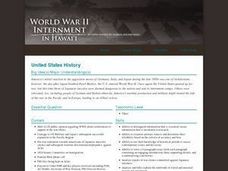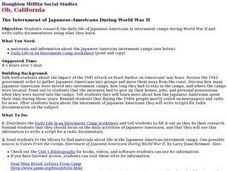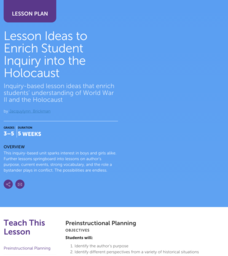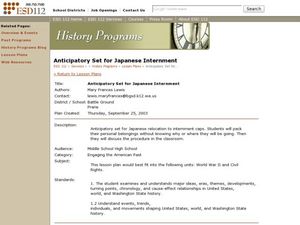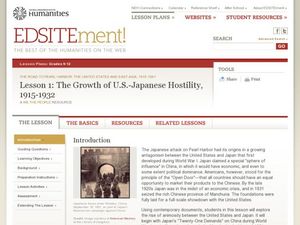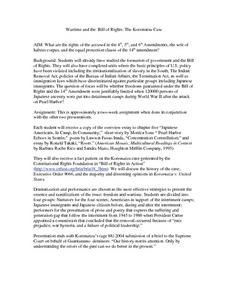Curated OER
The Home Front: Convincing Americans to Help America Prepare
Sixth graders examine the actions of the U.S. Government after the attack on Pearl Harbor. In this preparation for war lesson, 6th graders analyze WWII posters and view a clip on the American Home Front. Students discuss and list the...
Curated OER
World War II: Internment in Hawaii
Students examine world history by writing an essay in class. In this World War II lesson, students identify the attack on Pearl Harbor, the response from the U.S and the effect it had on Japanese-Americans. Students define Japanese...
Curated OER
Pacific War Timeline
Young scholars visit the George Bush Gallery of the Pacific War where they complete a timeline of important events. Prior to the visit, they create a blank timeline from 1937 to 1945 and fill in events discovered at the museum. After the...
Curated OER
The Internment of Japanese-Americans During World War II
Eleventh graders research the daily life of Japanese-Americans in internment camps during World War II and write radio documentaries using what they learn.
Curated OER
Local Mobilization for War
Tenth graders analyze how government policies led to complete concentration in war effort, evaluate how patriotism was encouraged by many local and state groups, and discuss fate of Japanese Americans.
US House of Representatives
From Exclusion to Inclusion, 1941–1992
The legacy of Japanese American internment impacted America for decades, including Congress. Class members consider the tenure of Asian American representatives in Congress and how the legacy of World War II affected their service. Other...
Smithsonian Institution
Racism and Removal: Japanese Incarceration During World War II
During World War II people saw how far the government's control would go, but it was at the expense of its citizens. The resource brings the conditions of Japanese American internment camps to light using primary documents. Scholars...
Curated OER
Lesson Ideas to Enrich Student Inquiry into the Holocaust
Students inquire about the Holocaust. In this Holocaust lesson, students read books and discuss their thoughts. Students also collect current event articles from newspapers. Students investigate ghettos, Pearl Harbor and Navajo Code...
Curated OER
"Martial Law in Hawaii After the Attack on Pearl Harbor"
Students explore the concepts of martial law, writ of habeas corpus, due process, discovery and human and constitutional rights during World War II. They assess the roles and responsibilities of government leaders and citizens during...
Curated OER
Do Suspected Enemies Have Rights?
Students investigate the history of Japanese immigration. They complete an online Webquest, explore various websites, answer discussion questions, and locate and read newspaper articles about enemy compatants.
Curated OER
Analyzing Japanese Imperialism
Pupils engage in a lesson in order to compare and contrast the Imperialism of Japan to that of the United States and Europe. Students can complete a variety of activities that include research questions, reflection from lecture, and...
Curated OER
Anticipatory Set for Japanese Internment
Students simulate Japanese relocation to internment camps after the bombing of Pearl Harbor. They select items to pack that are personally, sentimentally, and financially important to them. They create a Venn diagram comparing and...
Curated OER
Pearl Harbor
Students summarize reasons for the U.S. entrance into WWII. They evaluate the pros and cons of those reasons. Students constrict a time line of WWII events. They write in their journals: What role did emotions play in the U.S....
Curated OER
The Growth of U.S.-Japanese Hostility, 1915-1932
High schoolers explore the relationship between Japan and the United States between 1915 and 1932. In this diplomacy lesson, students examine the Open Door Policy, 21 Demands, and the invasion of Manchuria by Japan. High schoolers...
Curated OER
Wartime and the Bill of Rights: The Korematsu Case
Twelfth graders work together in groups to examine the discrimation Japanese Americans felt after the bombing of Pearl Harbor. Using primary source documents, they analyze and discuss the case of Fred Korematsu who was placed in an...
Curated OER
Wartime and the Bill of Rights: The Korematsu Case (Lesson 2)
Twelfth graders review how the government and Bill of Rights came into effect. Using primary source documents, they discuss if Japanese rights were violated when they were placed in internment camps after the bombing of Pearl Harbor. ...
Curated OER
Defining Moments-from the past with lessons for a post 9/11 world
Students use the spreadsheet to determine policy options, establish criteria for the solution, weight the criteria in terms of importance and rate the options relative to each criterion to determine a solution to the problem. They...
Curated OER
Japanese Internment and Korematsu v. US
Students study the internment camps and the trials of the Nisei. They compare the post-Pearl Harbor US with post-9/11 US and evaluate the decision of Korematsu v. US. They synthesize the material and write an assent/dissent opinion on...
Curated OER
"I" Witness to History
Young journalists write diary entries from the point of view of a person involved in a historical event. They focus on including facts, clear narration, and accurate description of the individual's feelings.
Utah Education Network (UEN)
Classical Appeals and War Speeches
Discuss classical appeals of rhetoric through the speeches of Winston Churchill and FDR. Learners read, annotate, and analyze the speeches by the men before using a graphic organizer to track the use of ethos, pathos, and logos.
Curated OER
Dr. Seuss Takes on Charles Lindbergh
Students study the leaders of the isolationist movement within the United States and the causes of the isolationist movement, they recognize and compare the perceptions of both the isolationists within the US and those who took a more...
Curated OER
Juan Verdades
Cement comprehension skills using the strategies in this activity. After reading the story, Juan Verdades by Joe Hays, learners use context clues to answer questions, identify main ideas and details, and sequence events.
School Improvement in Maryland
Executive Order
After reading information about Executive Order #9066, class members assume the voice of an 18 year-old Japanese-American born in California and placed in an internment camp. Individuals then craft a letter to President Roosevelt...
Stanford University
Japanese American Incarceration
Using documents, such as reports from government sources and civil rights activists, budding historians explore the justification for forcing hundreds of thousands of Japanese-Americans to leave their lives and re-evaluate that tragic...
Other popular searches
- Pearl Harbor Wwii
- Attack on Pearl Harbor
- Pearl Harbor Map
- Pearl Harbor Day
- Pearl Harbor Attack
- Social Studies, Pearl Harbor
- Pearl Harbor Lesson Plans
- Pearl Harbor Movie
- Pearl Harbor Crossword
- Pearl Harbor Crossword Puzzle
- Wwii Pearl Harbor Movie
- Bombing of Pearl Harbor



